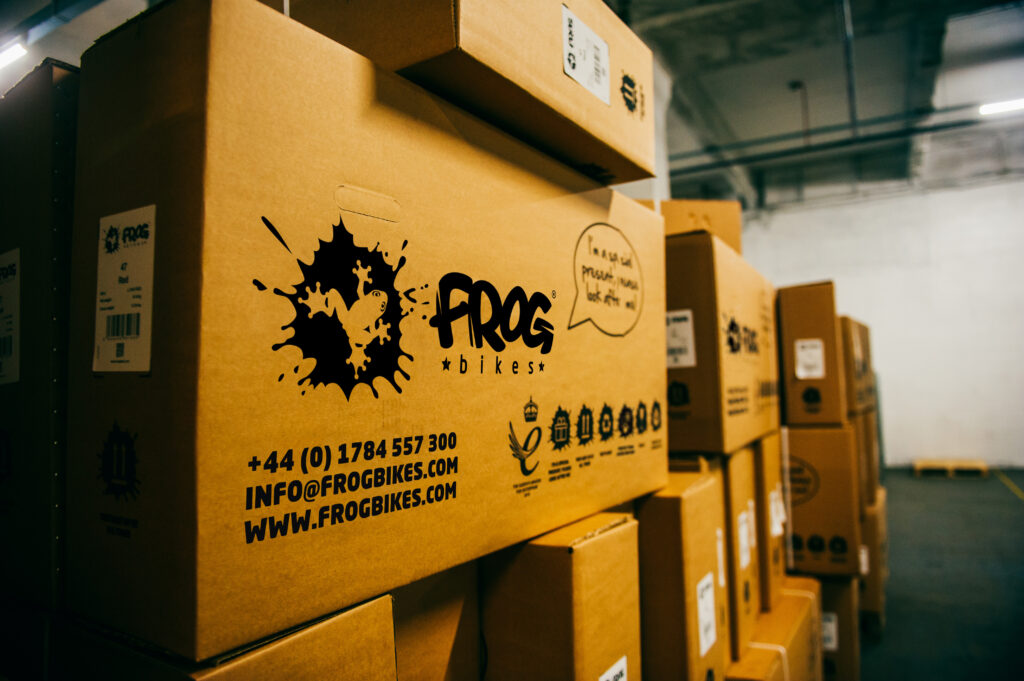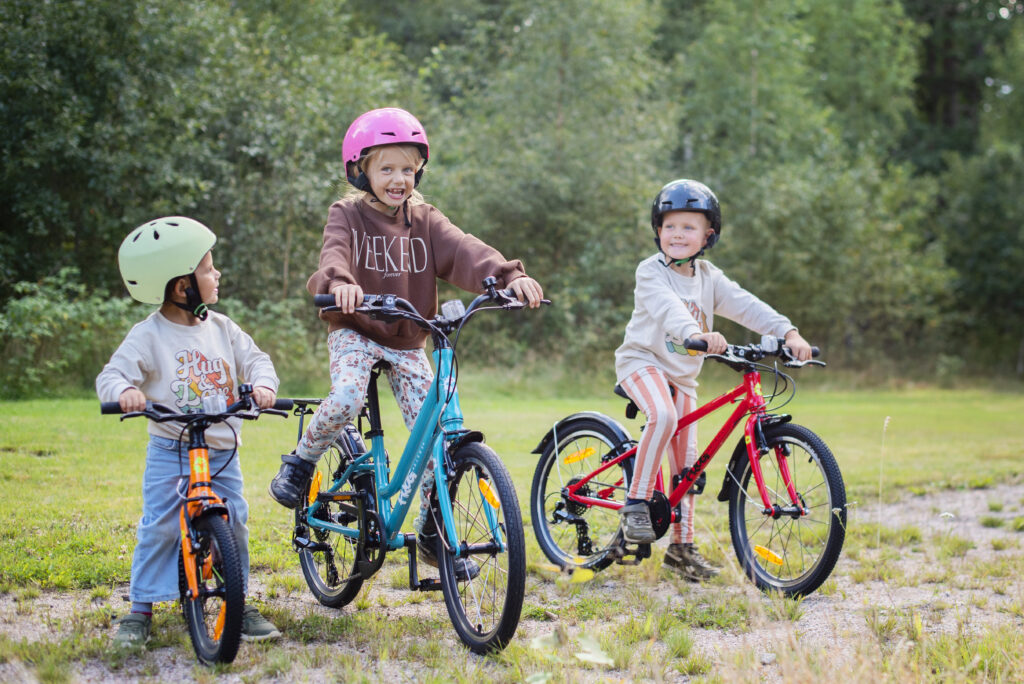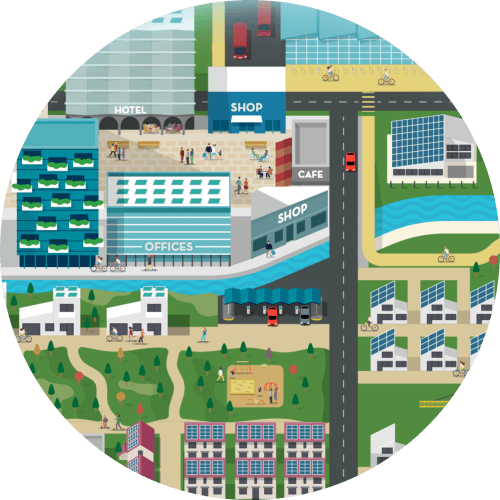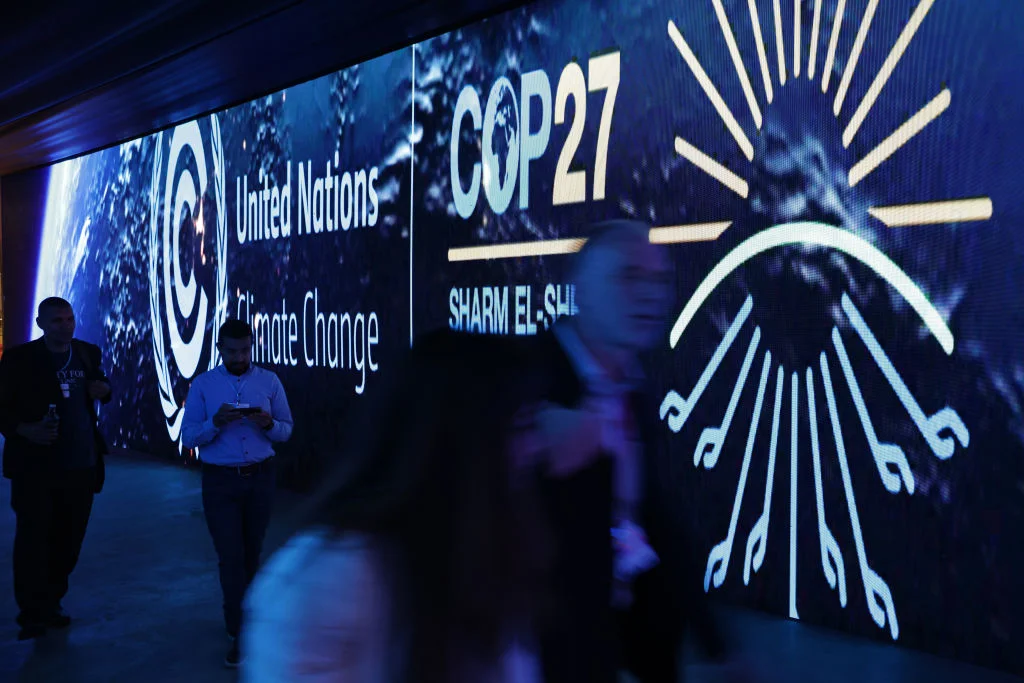Reinventing the wheel: Frog Bikes’ journey to net zero emissions

This article was first featured on the Climate Champions’ website, home to the Race to Zero.
Frog Bikes, a company dedicated to creating sustainable children’s bicycles, is on a mission to achieve net zero emissions. Anna Drew, the Head of Strategy & Sustainability, explains how Frog Bikes has embarked on an ambitious journey, as part of the SME Climate Hub and the Race to Zero campaign.
At Frog Bikes, our motivation for sustainability is deeply rooted in our commitment to a better future. While our bicycles help families reduce road emissions by opting for bike rides over car journeys, we also recognized the environmental impact of our materials and manufacturing processes. This realisation prompted us to take action. In 2019, we began measuring our carbon footprint, and by 2021, we joined the Race to Zero, committing to a 50% emissions reduction by 2030 and achieving net zero no later than 2050. This public commitment holds us accountable and inspires others in our supply chain and beyond.
Addressing emissions across all scopes
We address emissions across all three scopes of the Greenhouse Gas Protocol. We have no direct emissions (Scope 1) due to the absence of on-site boilers or generators, and our company-owned vehicles are fully electric, charged using renewable energy. For indirect emissions from purchased energy (Scope 2), we persuaded our landlords to switch to renewable electricity and are exploring options for green gas. Additionally, we have implemented energy-efficient measures in our factory, such as low voltage lighting and power-efficient tools.
Scope 3 emissions, which are other indirect emissions, present a significant challenge for us. We continuously innovate to minimise material usage in our products, exemplified by our lighter cranks and redesigned bike wheels with fewer spokes. We use novel materials, such as our FrogFit Technology® pedals made from rice husk composite, reducing plastic use by 50%. This year, we began transitioning to post-consumer recycled aluminium in our bikes, a major step given that aluminium is our emissions hotspot. Our packaging is also highly sustainable, with boxes made from 82% recycled cardboard and almost all plastics eliminated. Logistics-wise, we prioritise sea shipping over air freight, with less than 1% of components transported by air in 2023. To encourage sustainable commuting, we provide EV charging points at our sites, with around 15% of employees driving electric vehicles.
Strategic goals and reporting
In the short term, we are focused on incorporating 25% post-consumer recycled aluminium into our best-selling bikes, with plans to expand this to more models. Over the next few years, we aim to increase this to at least 50% recycled aluminium, working closely with our supply chain to achieve this. Our long-term vision includes implementing a circular model, refurbishing and reselling old Frog Bikes to extend their lifecycle and reduce waste.
We report our progress against climate targets through an annual emissions report available on our website and submitted to the SME Climate Hub. We follow the GHG Protocol for our measurement and capture most of our activity data through our Enterprise Resource Planning (ERP) system, combining it with publicly available emissions factors. Since 2021, we have reduced emissions per bike by 25%, reflecting numerous improvements across our business, from bike design to packaging and travel habits. This progress positions us well to halve our emissions by 2030.

Policy & engagement
Aligning our external policy and engagement activities with our climate commitments, we publish annual emissions reports and participate in industry groups like the Bicycle Association and Shift Cycling Culture. We share our sustainability journey with a wider audience, including organizations like the Entrepreneur’s Forum, Prince’s Trust, Cranfield University, and Climate Wales, helping to raise awareness and inspire others.
Key lessons from our journey include the importance of a data-driven approach to identify environmental impact hotspots, focusing on quick wins within direct control, and engaging the supply chain early. We emphasize that sustainability should be a team effort, integrating it into everyone’s roles to generate better ideas and attract top talent.
Innovation & leadership
Frog Bikes stands out in the bicycle industry through early adoption of sustainability practices and a holistic approach combining recycled materials with innovative, lightweight designs. Our commitment to using more than 50% post-consumer recycled aluminium, we believe, sets a new standard in the industry. Our vision for the future involves achieving fully closed-loop operations, where all end-of-life bikes are reused, remanufactured, or recycled, requiring industry-wide collaboration.
Customer and stakeholder engagement
Engaging with customers and stakeholders about sustainability is crucial for us. We highlight our sustainability credentials when talking to new stores, partners, and suppliers, and share our progress openly in our annual sustainability report. Our communications strategies include website content, blog posts, emails, and social media, balancing education and engagement with practical suggestions for families.
Company culture
Company culture plays a vital role in advancing our sustainability objectives. We cultivate a culture that supports environmental goals by encouraging employee suggestions, integrating sustainability into company values, considering environmental impact in board decisions, and measuring and communicating our impact internally and externally. We also conduct an annual employee sustainability survey to track progress and identify barriers.
Overcoming challenges
A significant challenge we faced was aligning our supply chain with post-consumer recycled aluminium. Through persistence, education, and collaboration, we overcame misconceptions and demonstrated that recycled aluminum could meet the same high-performance standards as virgin aluminum. This effort not only benefits Frog Bikes but also showcases the viability of a more sustainable approach.
Support
Support from the SME Climate Hub and Race to Zero has been invaluable for us. The SME Climate Hub’s tools provided a clear starting point for measuring emissions and identifying areas for improvement. The Race to Zero’s 1.5°C business playbook is guiding our long-term sustainability action plan. Being part of the SME Climate Hub network connects us with other sustainability-focused businesses, creating opportunities for knowledge sharing and collaboration.
At Frog Bikes, our commitment to sustainable bicycle manufacturing is driven by a desire to safeguard the future for the next generation. We recognize the urgent need for businesses to act now, not just in decades to come. Our efforts aim to create a healthier planet for the children and families who rely on our bikes. By making these changes today, we hope to inspire others to join us in taking immediate and meaningful action towards a sustainable future.
For more detailed insights, you can view Frog Bikes’ annual emissions reports on their website.

 Go back
Go back







